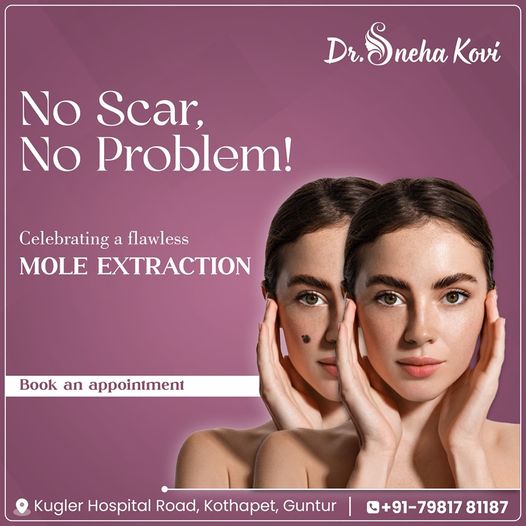In this article, we will explore various treatments, including five dermatologist-approved skincare treatments that can make a significant difference.
Introduction
Dark scars can be a source of frustration and affect self-confidence. These marks often result from acne, injuries, or surgeries and can linger for months or even years. Fortunately, there are effective methods to reduce and eliminate dark scars, helping you achieve clearer and healthier skin.
Understanding Dark Scars
Types of Dark Scars
Dark scars come in various forms, and understanding them can help in choosing the right treatment.
- Post-inflammatory Hyperpigmentation (PIH): These are flat spots that range in color from pink to red, brown, or black, depending on skin tone. They appear after skin inflammation or injury.
- Post-inflammatory Erythema (PIE): These scars are usually red or purple and occur due to damage to the blood vessels near the skin’s surface.
Causes of Dark Scars
Dark scars form as a result of increased melanin production in response to skin damage or inflammation. Factors like picking at your skin, excessive sun exposure, and certain skin conditions can exacerbate the appearance of these scars.
Psychological Impact
Living with dark scars can lead to self-consciousness and affect mental well-being. It’s important to address not only the physical appearance but also the emotional impact these scars can have.
General Skincare Tips for Dark Scars
Daily Skincare Routine
A consistent skincare routine can significantly help in managing dark scars.
- Cleansing: Use a gentle cleanser to remove dirt and oil without irritating your skin.
- Exfoliating: Exfoliate your skin 2-3 times weekly to remove dead skin cells and encourage cell renewal. Use a gentle touch to avoid irritating your skin.
- Moisturizing: Keep your skin hydrated with a good moisturizer that suits your skin type. Hydration helps in skin repair and regeneration.
Sun Protection
UV rays can worsen dark scars. Always apply a broad-spectrum sunscreen with at least SPF 30, even on cloudy days, to protect your skin.
Healthy Lifestyle Choices
Eating a balanced diet rich in vitamins and antioxidants, staying hydrated, and getting enough sleep can improve your skin’s health and aid in scar healing.
Top 5 Dermatologist-Approved Skincare Treatments
Topical Treatments
Retinoids
These vitamin A derivatives speed up cell turnover and fade dark spots over time. They can be found in over-the-counter products or prescribed by a dermatologist.
Vitamin C
Known for its brightening properties, vitamin C can lighten dark scars and even out skin tone.
Hydroquinone
This is a powerful skin-lightening agent that dermatologists often recommend for treating dark scars. It inhibits melanin production.
Chemical Peels
Chemical peels use acids to exfoliate the top layers of skin, promoting new skin growth and reducing the appearance of dark scars. Glycolic acid, salicylic acid, and lactic acid peels are widely utilized.
Microdermabrasion
This minimally invasive procedure involves exfoliating the skin with tiny crystals to remove dead skin cells and stimulate new skin growth, helping to fade dark scars.
Laser Therapy
Laser treatments target dark scars with concentrated light energy, breaking down the pigment and encouraging skin regeneration. Different types of lasers, like fractional lasers and Q-switched lasers, are used based on the scar type and skin tone.
Microneedling
Microneedling involves using tiny needles to create micro-injuries in the skin, triggering collagen production and skin repair. This process can improve the texture and appearance of dark scars.
Home Remedies for Dark Scars
Natural Ingredients
Aloe Vera
This soothing plant extract helps reduce inflammation and promotes healing, making it effective for treating dark scars.
Lemon Juice
Known for its natural bleaching properties, lemon juice can lighten dark spots. However, it’s essential to use it with caution as it can be irritating.
Honey
Honey has natural healing properties and can help in fading dark scars when applied regularly.
DIY Skincare Recipes
Create a mask with aloe vera gel and a few drops of lemon juice for a brightening effect. Another option is mixing honey with a bit of cinnamon powder to make a scar-fading paste.
Prevention Tips
Avoiding Sun Exposure
Reduce your sun exposure, especially during the hours when the sun is strongest. Wear protective clothing, hats, and sunglasses to guard your skin against UV rays.
Proper Wound Care
Take care of wounds properly by keeping them clean and covered to prevent infection and reduce the risk of dark scar formation.
Using Gentle Skincare Products
Avoid harsh products that can irritate your skin. Opt for gentle, non-comedogenic products to maintain your skin’s health.
Conclusion
Dealing with dark scars requires patience and the right approach. By understanding the types of scars and using dermatologist-approved treatments, you can significantly improve your skin’s appearance. Remember to follow a consistent skincare routine, protect your skin from the sun, and consult a dermatologist for personalized advice. For the best skincare treatment, call Dr. Sneha Kovi, Consultant Dermatologist.
FAQs
Can dark scars completely disappear?
While it’s challenging to completely eliminate dark scars, they can fade significantly with the right treatment and care.
How long does it take to see results from treatments?
Results vary depending on the treatment and individual skin type. Generally, you may start seeing improvements in a few weeks to a few months.
Are there any side effects of using topical treatments?
Some topical treatments can cause irritation, redness, or dryness. It’s essential to use them as directed and consult a dermatologist if you experience adverse effects.
Can home remedies be as effective as professional treatments?
Home remedies can help, but they may not be as effective or quick-acting as professional treatments. Combining both approaches can often yield the best results.
How can I prevent dark scars from forming?
Prevent dark scars by avoiding picking at your skin, using sun protection, and following proper wound care practices.

